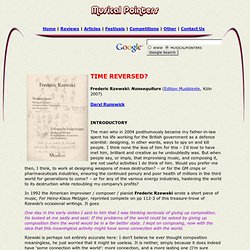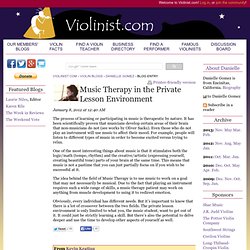

Musical Pointers. Frederic Rzewski: Nonsequiturs (Edition Musiktexte, Köln 2007) Daryl Runswick The man who in 2004 posthumously became my father-in-law spent his life working for the British government as a defence scientist: designing, in other words, ways to spy on and kill people.

I think none the less of him for this – I’d love to have met him, brilliant and creative as he undoubtedly was. But when people say, or imply, that improvising music, and composing it, are not useful activities I do think of him. Would you prefer me then, I think, to work at designing weapons of mass destruction? In 1992 the American improviser / composer / pianist Frederic Rzewski wrote a short piece of music, For Heinz-Klaus Metzger, reprinted complete on pp 112-3 of this treasure-trove of Rzewski’s occasional writings.
One day in the early sixties I said to him that I was thinking seriously of giving up composition. This is definitely a non-mainstream list, but it points to Rzewski’s tastes. Frederic Rzewski - Education - Information - Educational Resources - Encyclopedia - Music. Frederic Rzewski (born April 13, 1938) is an American composer. He attended Harvard and Princeton, where his teachers included Virgil Thompson, Roger Sessions, Walter Piston and Milton Babbitt. In 1960, he went to Italy, a trip which was formative in his future musical development: in addition to studying with Luigi Dallapiccola, he commenced a career as a performer of new piano music, often with an improvisatory element. A few years later he became a co-founder of Musica Elettronica Viva with Alvin Curran and Richard Teitelbaum.
Musica Elettronica Viva conceived music as a collective, collaborative process, with improvisation and live electronic instruments prominently featured. In 1971 he returned to New York. In 1977 Rzewski became Professor of Composition at the Conservatoire Royal de Musique in Liège, Belgium. Most of Rzewski's works are overtly political and feature improvisational elements. The Copyleft I think that this is the best way for the music to get around. Sources. Mossgraffiti. Starry Night (interactive animation) 75.101.149.73/wnet/nature/files/2008/11/naturecomic3_lobo.pdf. Www.pbs.org/wnet/nature/pdf/Nature_Comic_Book.pdf. Stikman - a Look at Mysterious Stickman Street Art in Crosswalks. Stikman in San Francisco Now, along with Washington DC, Boston, Hollywood, Philadelphia, Wheeling, WV, Ann Arbor, and Minneapolis (according to Murph2che), stikman figures can be found in San Francisco.

The cluster with which I am familiar in the city is located South of Market, around the San Francisco Museum of Modern Art. The San Francisco stikmen can be found in crosswalks at the following places: Mission & New MontgomeryMission & Yerba Buena LaneMission & 4th Street There are probably more locations- this is just a spot I wear thin during lunchtime walks.
Should you see a stickman or stikmen in San Francisco, or in any place for that matter, take a moment to appreciate your discovery of one of the world's many fascinating little mysteries. The Man Behind Stikman Because their creator is anonymous, it is impossible to know if stickman's creator is one person or a group of people.
Music Therapy in the Private Lesson Environment. January 8, 2012 at 12:40 AM The process of learning or participating in music is therapeutic by nature.

It has been scientifically proven that musicians develop certain areas of their brain that non-musicians do not (see works by Oliver Sacks). Even those who do not play an instrument will use music to affect their mood. For example, people will listen to different types of music in order to become excited versus trying to relax. One of the most interesting things about music is that it stimulates both the logic/math (tempo, rhythm) and the creative/artistic (expressing yourself, creating beautiful tone) parts of your brain at the same time. The idea behind the field of Music Therapy is to use music to work on a goal that may not necessarily be musical.
Obviously, every individual has different needs. Completely agree. I agree that there is a creative part of the brain musicians use. ---Ann Marie From Terry Hsu Posted on January 11, 2012 at 2:46 PM.